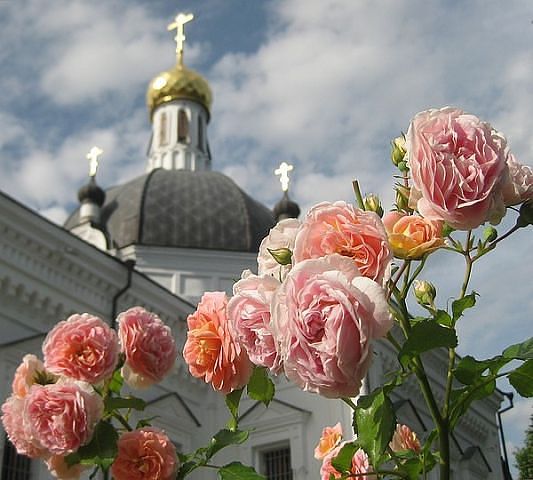Несложно от добра произвести добро, но удивительно злое обратить в доброе; есть общая поговорка: «На спокойном море всяк может быть кормчим». Невелика мудрость, когда ветер попутный, корабль крепок, море спокойно и матросы корабля знают свое дело, пристань видна, – направить к ней корабль. Но иное дело, когда на море бушует буря, корабль поврежден, волны с шумом вливаются на палубу и внутрь корабля или когда ночь темная, ничего не видно, пираты окружили судно, экипаж малочислен и плохо вооружен и при этом капитан так искусно распорядился, что безбедно избежал опасности; вот это удивительно: капитан корабля делом доказал свою мудрость и свою опытность в управлении кораблем.
Подобное замечаем мы и в мироправлении Божием: попущение воли Божией, кажущееся нам не ведущим к добру, Бог приводит к наилучшему концу по Своей неизреченной Премудрости и правде. Через попущение противозаконных деяний и горестных приключений Бог иногда беззаконников превращает в честнейших друзей Своих; по Божию Промыслу, направляющему все к наилучшему завершению, злостные замыслы для вреда обольщаемого ими часто обращаются ему в пользу и честь; нападения и обиды нередко умножают его силы; величайшие беззакония нечестивых утверждают многих в благочестии и добродетели и предохраняют от погибели; оттуда же происходит, что многие люди, по-видимому, уже совершенно погружены в бездну погибели, но на деле оказывается, что они через то самое спасены. Иосифу узы и темница служат к почестям и к его величайшей славе, братняя зависть доставила ему больше пользы, чем благоволение всего мира; Саулова злоба доставила Давиду царский венец; львиный ров ввел Даниила в большую честь и славу, каких не достигали и цари земные; Христос со креста вошел в рай вместе с покаявшимся разбойником, а с горы Елеонской вознесся на небеса и сел по правую сторону Бога Отца.
Если бы Бог не допускал грехопадений, и допущенных не исправлял, и не производил бы от злых деяний добрых последствий, то едва ли могли бы мы узнать присущую Боту правду, карающую злых и награждающую праведных. Но через такое попущение злых деяний мы научаемся познавать пользу исследования самих попущений и убеждаемся, какими чудными путями Бог из величайших зол производит бесчисленное множество добра.
(из книги "Илиотропион, или сообразование с Божественной волей", святитель Иоанн Тобольский)
Подобное замечаем мы и в мироправлении Божием: попущение воли Божией, кажущееся нам не ведущим к добру, Бог приводит к наилучшему концу по Своей неизреченной Премудрости и правде. Через попущение противозаконных деяний и горестных приключений Бог иногда беззаконников превращает в честнейших друзей Своих; по Божию Промыслу, направляющему все к наилучшему завершению, злостные замыслы для вреда обольщаемого ими часто обращаются ему в пользу и честь; нападения и обиды нередко умножают его силы; величайшие беззакония нечестивых утверждают многих в благочестии и добродетели и предохраняют от погибели; оттуда же происходит, что многие люди, по-видимому, уже совершенно погружены в бездну погибели, но на деле оказывается, что они через то самое спасены. Иосифу узы и темница служат к почестям и к его величайшей славе, братняя зависть доставила ему больше пользы, чем благоволение всего мира; Саулова злоба доставила Давиду царский венец; львиный ров ввел Даниила в большую честь и славу, каких не достигали и цари земные; Христос со креста вошел в рай вместе с покаявшимся разбойником, а с горы Елеонской вознесся на небеса и сел по правую сторону Бога Отца.
Если бы Бог не допускал грехопадений, и допущенных не исправлял, и не производил бы от злых деяний добрых последствий, то едва ли могли бы мы узнать присущую Боту правду, карающую злых и награждающую праведных. Но через такое попущение злых деяний мы научаемся познавать пользу исследования самих попущений и убеждаемся, какими чудными путями Бог из величайших зол производит бесчисленное множество добра.
(из книги "Илиотропион, или сообразование с Божественной волей", святитель Иоанн Тобольский)
It is easy to produce good from good, but surprisingly evil to turn into good; There is a common saying: "On a calm sea, everyone can be helmsman." Wisdom is small, when the wind is fair, the ship is strong, the sea is calm and the sailors of the ship know their business, the pier is visible - send a ship to it. But it’s another matter when a storm is raging on the sea, the ship is damaged, the waves pour into the deck and into the ship with noise, or when the night is dark, nothing is visible, the pirates surrounded the ship, the crew is small and poorly armed and the captain so skillfully ordered that it is comfortable avoided danger; this is surprising: the captain of the ship proved his wisdom and his experience in managing the ship.
We also observe a similar thing in God's world rule: letting God's will, which seems to us not leading to good, God leads to a better end in His indescribable Wisdom and truth. Through the allowance of illegal acts and woeful adventures, God sometimes turns the wicked into His most honest friends; according to God's Providence, which directs everything to its best conclusion, malicious designs for harming the deceived by them often turn to him in favor and honor; attacks and grievances often increase his strength; the greatest iniquities of the wicked affirm many in piety and virtue and protect them from perdition; from there it happens that many people, apparently, are already completely immersed in the abyss of death, but in fact it turns out that they are saved through that very thing. The bonds and dungeon serve Joseph for honors and for his greatest glory, brotherly envy did him more good than the goodwill of the whole world; Saul’s anger brought David a royal crown; the lion's moat introduced Daniel to great honor and glory, which the kings of the earth did not reach; Christ from the cross entered heaven with the repentant robber, and from the Mount of Olives he ascended into heaven and sat on the right side of God the Father.
If God did not allow the fall, and did not correct the committed, and would not produce good consequences from evil deeds, then we could hardly find out the truth inherent in Botha, punishing the evil and rewarding the righteous. But through such an indulgence of evil deeds, we learn to learn the benefits of researching the apparitions themselves and are convinced by what miraculous ways God of the greatest evils produces innumerable good.
(from the book "Eliotropion, or Consciousness with the Divine Will," St. John of Tobolsk)
We also observe a similar thing in God's world rule: letting God's will, which seems to us not leading to good, God leads to a better end in His indescribable Wisdom and truth. Through the allowance of illegal acts and woeful adventures, God sometimes turns the wicked into His most honest friends; according to God's Providence, which directs everything to its best conclusion, malicious designs for harming the deceived by them often turn to him in favor and honor; attacks and grievances often increase his strength; the greatest iniquities of the wicked affirm many in piety and virtue and protect them from perdition; from there it happens that many people, apparently, are already completely immersed in the abyss of death, but in fact it turns out that they are saved through that very thing. The bonds and dungeon serve Joseph for honors and for his greatest glory, brotherly envy did him more good than the goodwill of the whole world; Saul’s anger brought David a royal crown; the lion's moat introduced Daniel to great honor and glory, which the kings of the earth did not reach; Christ from the cross entered heaven with the repentant robber, and from the Mount of Olives he ascended into heaven and sat on the right side of God the Father.
If God did not allow the fall, and did not correct the committed, and would not produce good consequences from evil deeds, then we could hardly find out the truth inherent in Botha, punishing the evil and rewarding the righteous. But through such an indulgence of evil deeds, we learn to learn the benefits of researching the apparitions themselves and are convinced by what miraculous ways God of the greatest evils produces innumerable good.
(from the book "Eliotropion, or Consciousness with the Divine Will," St. John of Tobolsk)

У записи 4 лайков,
0 репостов,
190 просмотров.
0 репостов,
190 просмотров.
Эту запись оставил(а) на своей стене Вероника Вовденко

























